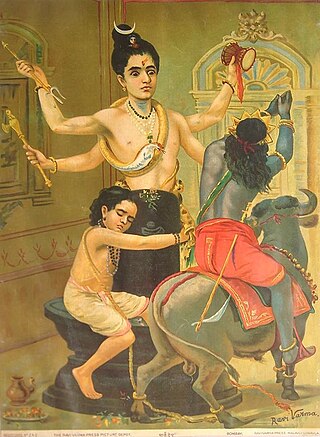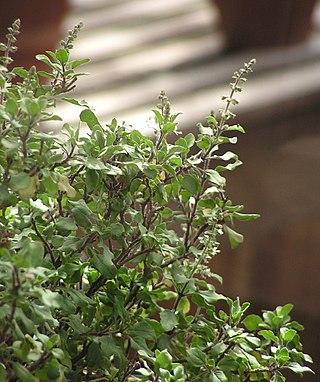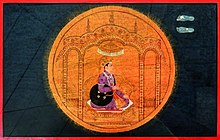
In Hinduism, Daksha is one of the Prajapati, the agents of creation, as well as a divine king-rishi. His iconography depicts him as a man with a stocky body and a handsome face or the head of a goat.

Devaki is a character in Hindu literature, most noted for being the mother of the god Krishna. She is one of the seven daughters of Devapa or Devaka, a king of the Yadu dynasty, and has four brothers. She is one of the wives of Vasudeva. Her cousin is Kamsa, the king of Mathura, a cruel tyrant who had been told by Narada that he had been an asura killed by Vishnu in his previous life (Kalanemi), exacerbating his wickedness. According to popular tradition, Devaki is considered to be an incarnation of Aditi, a mother goddess who was the daughter of Daksha and the wife of Kashyapa.

The Bhagavata Purana, also known as the Srimad Bhagavatam, Srimad Bhagavata Mahapurana or simply Bhagavata (Bhāgavata), is one of Hinduism's eighteen major Puranas (Mahapuranas) and one of the most popular in Vaishnavism. Composed in Sanskrit and traditionally attributed to Veda Vyasa, it promotes bhakti (devotion) towards Krishna, an avatar of Vishnu, integrating themes from the Advaita (monism) philosophy of Adi Shankara, the Vishishtadvaita of Ramanujacharya and the Dvaita (dualism) of Madhvacharya. It is widely available in almost all Indian languages.
Shatarupa is the daughter of the creator deity, Brahma. According to Brahma Purana, Shatarupa is regarded as the first woman to be created by Brahma, marrying Manu, the first man. Their descendants are called manushya, the Sanskrit term for mankind.
Vena is a king in Hinduism, notorious for his wickedness and misrule. A descendant of the first Manu, he bans all worship, offerings, and sacrifices upon his accession. After denying all petitions to restore these practices, Vena is slain by sages with their consecrated blades of grass. He is succeeded by the legendary king Prithu, who springs from his right arm.
Manu is a term found with various meanings in Hinduism. In early texts, it refers to the archetypal man, or the first man. The Sanskrit term for 'human', मनुष्य or मानव means 'of Manu' or 'children of Manu'. In later texts, Manu is the title or name of fourteen rulers of earth, or alternatively as the head of dynasties that begin with each cyclic kalpa (aeon) when the universe is born anew. The title of the text Manusmriti uses this term as a prefix, but refers to the first Manu – Svayambhuva, the spiritual son of Brahma. In the Hindu cosmology, each kalpa consists of fourteen Manvantaras, and each Manvantara is headed by a different Manu. The current universe, is asserted to be ruled by the 7th Manu named Vaivasvata. Vaivasvata was the king of Dravida before the great flood. He was warned of the flood by the Matsya (fish) avatar of Vishnu, and built a boat that carried the Vedas, Manu's family and the seven sages to safety, helped by Matsya. The tale is repeated with variations in other texts, including the Mahabharata and a few other Puranas.

Alaka, also called Alakapuri or Alkavati, is a city featured in Hinduism. It is the home of Kubera, the king of a race called the yakshas and the god of wealth. The Mahabharata mentions this city as the capital of the Yaksha kingdom. This city is said to rival Amaravati, the capital of Indra, the king of the devas, in its architecture, opulence, and overall splendour. It is quoted in the Sanskrit lyrical poem Meghadūta by Kalidasa.

In Hindu mythology, the Narayanastra is an astra, a celestial missile, affiliated to the Hindu deity, Vishnu, in his form of Narayana.
Svayambhu is a Sanskrit word that means "self-born", "self-manifested", "self-existing", or "that that is created by its own accord". Various deities and entities featured in Hindu literature and tradition are regarded to be svayambhu, such as Brahman in the Upanishads, and the Trimurti of Brahma, Vishnu, and Shiva, and Manu in the Puranas.

Markandeya is a rishi (sage) featured in Hindu literature. He is the son of the sage Mrikanda and his wife, Manasvini. The Markandeya Purana, attributed to the sage, comprises a dialogue between Markandeya and a sage called Jaimini. A number of chapters in the Bhagavata Purana are dedicated to his conversations and prayers. He is also mentioned in the Mahabharata. Markandeya is venerated within all mainstream Hindu traditions.

The Devi Bhagavata Purana, also known as the Devi Purana or simply Devi Bhagavatam, is one of the eighteen Mahapuranas as per Shiva Purana of Hinduism. Composed in Sanskrit by Veda Vyasa, the text is considered a major purana for Devi worshippers (Shaktas). It promotes bhakti (devotion) towards Mahadevi, integrating themes from the Shaktadvaitavada tradition. While this is generally regarded as a Shakta Purana, some scholars such as Dowson have also interpreted this Purana as a Shaiva Purana.
Paundraka Vāsudēva was a king appearing in Mahabharata and Bhagavata Purana. According to it, he was the king of Pundra Kingdom. Some sources state he was an ally of both Jarasandha, the king of Magadha and Shakuni, the king of the Gandhara Kingdom. He was a major enemy of Krishna. He imitated Krishna, believing himself to be Vāsudeva, or God. Later he was killed by Krishna in battle. According to some scriptures, Paundraka was Krishna's doppelganger. He is considered to be an incarnation of the demoniac King Vena as per some sources. There is also a reference that he was allies with king Kashiraja

Yajna or Yajñeśvara is mentioned as an avatar of the Hindu god Vishnu in Hindu literature. As Yajna, Vishnu is the embodiment of the Hindu sacrifice ritual, Yajna. He is also the Indra of the Svayambhuva Manvantara, the era of Svayambhuva Manu. His father is Ruci, and his mother is Ākūti.

Vidyadhara(s) (Sanskrit Vidyādhara, meaning "wisdom-holders") are a group of supernatural beings in Indian religions who possess magical powers. In Hinduism, they also attend Shiva, who lives in the Himalayas. They are considered Upadevas, or demi-gods.

Tulasi, Tulsi or Vrinda is a sacred plant in Hindu tradition. Hindus regard it as an earthly manifestation of the goddess Tulasi; she is regarded as the avatar of Lakshmi, and thus the consort of the god Vishnu. In another iteration, as Vrinda, she is married to Jalandhara. The offering of its leaves is recommended in ritualistic worship of Vishnu and his avatars, like Krishna and Vithoba.

In Hindu cosmology, the Karanodaka or the Garbhodaka, also referred to as the Causal Ocean, is the origin of material creation. It is the place in the spiritual sky where Mahavishnu lies down and creates the material world. The Causal Ocean is the border between the spiritual and material worlds.
Rantideva is a king of the Lunar dynasty in Hinduism. Described to be benevolent, he is stated to have achieved moksha (liberation) from Vishnu when the Trimurti tested his faith. A descendant of Bharata, he is described as a generous king in Hindu literature.
Svayambhuva Manu is the first of the fourteen Manus, the first man of a Yuga in Hindu cosmogony. He is the manasaputra of Brahma and husband of Shatarupa, the first woman. He is stated to have divided the Vedas into four sections.

Pītāmbara is a term in Hindu iconography, meaning "yellow garment or shawl", also translated as "clothed in yellow garments", and "name of Vishnu-Krishna". It is primarily depicted on the deity Vishnu and his incarnations, regarded to represent the Vedas.

Mura was a very powerful asura (demon) mentioned in Hindu scriptures, who served as a general in Narakasura's army. Narakasura was the evil demon King of Pragjyotisha, and Mura died during his battle with Sri Krishna















